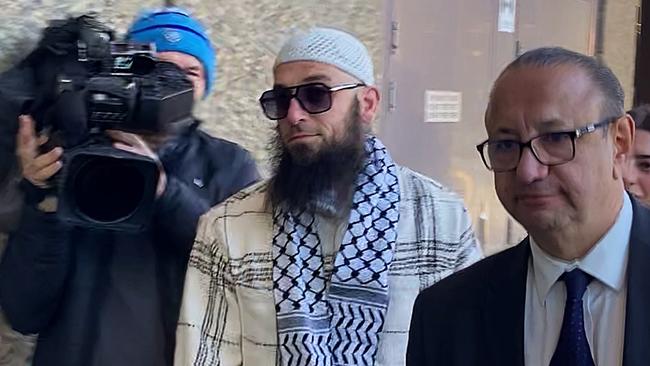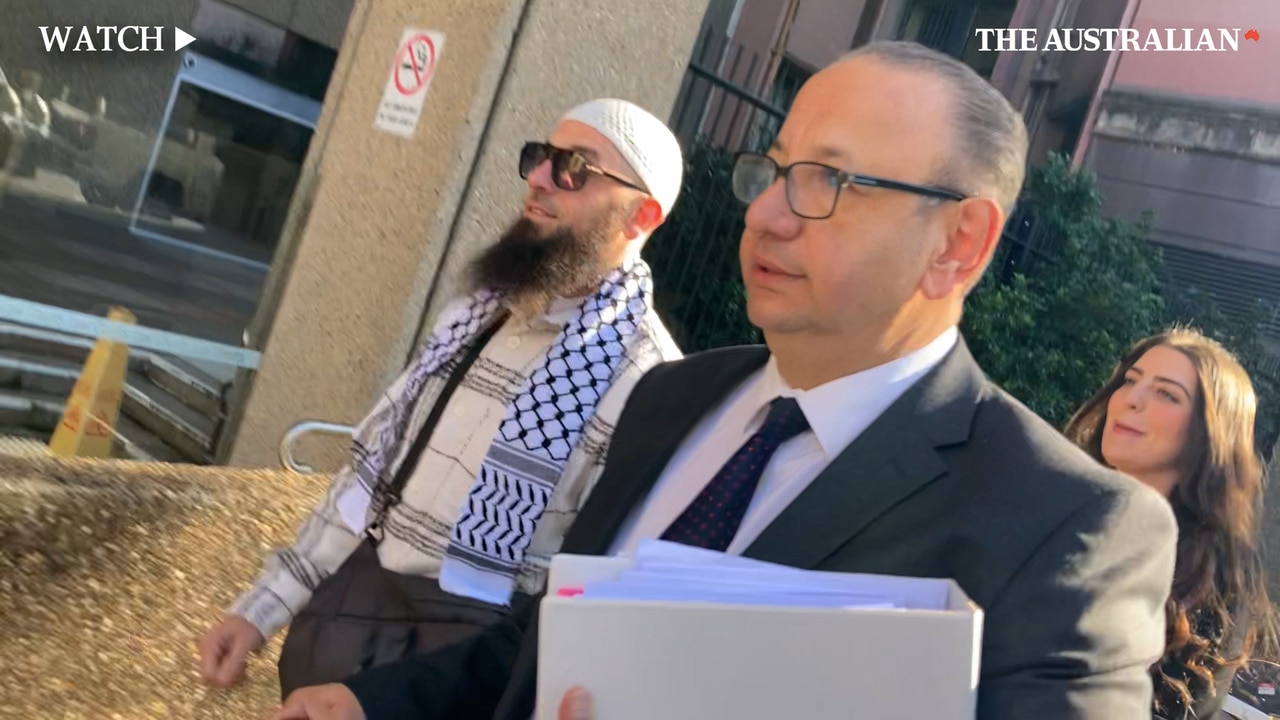Jihadi preacher’s sermons ‘comfort to Muslim congregants’, court told
Lawyers for Wissam Haddad have argued his sermons were given to provide private ‘comfort’, despite accusations he was in active dialogue with reporters as a self-proclaimed ‘mosque shock jock’.

Lawyers for jihadi preacher Wissam Haddad have argued his sermons were given to provide private “comfort” to Muslim congregants, despite accusations he was in active dialogue with reporters as a self-proclaimed “masjid (mosque) shock jock”.
Mr Haddad, whose first name is William but who is also known as Abu Ousayd, arrived at court on Tuesday ahead of his racial discrimination hearing, avoiding questions and surrounded by his legal team, staring down a four-day trial over allegations by the Executive Council of Australian Jewry that he breached the Racial Discrimination Act through his sermons in the wake of the Hamas October 7, 2023 attacks on Israel.
Mr Haddad or speakers at his Al Madina Dawah Centre have called Jewish people “descendants of pigs and monkeys”, recited parables about their killing and said people should “spit” on Israel so its citizens “would drown”.
In most cases, he has claimed he was referring to or reciting Islamic scripture. He sat in the front row of the Federal Court and did not rise or bow to judge Angus Stewart as proceedings began or were adjourned.
ECAJ co-chief executive Peter Wertheim and deputy president Robert Goot SC first launched court action against Mr Haddad and his Bankstown-based Al Madina Dawah Centre in October after a failed mediation process in the Human Rights Commission.
In a provocative video posted before the hearing Mr Haddad stated that “we are not going to come (to the trial) unarmed, we’re going to fight them with everything that we have”, followed by the image of a sword.

Peter Braham, representing Mr Wertheim and Mr Goot, said Mr Haddad’s behaviour had “the effect of normalising anti-Semitic prejudices and the expression of them, and (could) encourage acts of violence against Jewish people”.
“He makes no distinction between Jews who support Israel today and Jews who don’t. As we will see, in fact, the speeches were just speeches about Jews, ascribing to Jewish people certain negative characteristics, and encouraging his audience to hold those views,” he said.
“The intent of the speeches was to persuade an audience that the Jewish people had certain immutable and eternal characteristics that caused them to come into conflict with Muslims.”
Andrew Boe, representing Mr Haddad, suggested a judgment against his client would unjustly limit freedom of speech, saying the “boundaries of legitimate debate cannot be set so narrowly as to exclude that which is not polite, bland (or) muted”.
“It cannot be … that Section 18C (of the Racial Discrimination Act) can be contravened because some people in a group have gone out of their way to expose themselves to speech which they might reasonably expect to be critical of Israel,” Mr Boe said.
“It would be analogous to a person with a prudish sensitivity seeking out pornography on the web and then complaining about being offended by it.
“Mr Haddad’s evidence will be (that) his motivation was to respond to expressions of great distress … by providing historical and religious context on those events in an attempt to provide spiritual comfort to them. That motivation is entirely consistent with the content of the speeches.”
He argued that Mr Haddad throughout his sermons addressed only historical Jewish tribes referenced in the Koran or the state of Israel, not the global Jewish diaspora.
Mr Braham disputed this purported intention, and said Mr Haddad knowingly began a public dialogue with journalists who reported on his sermons, including citing articles by this masthead.
“Mr Haddad read these newspaper articles and, as you see in his speech, he responds to them … and he says, ‘Hey, journalists, get your microphones ready, I’ve got more’,” Mr Braham said.
He pointed to extracts from Mr Haddad’s speeches.
“Today, I’m going to be a masjid (mosque) shock jock, and I want to rub salt in the wound so on Monday they have something to report about,” Mr Haddad said in a speech played before the court.
ECAJ is seeking declarations that he contravened Section 18C, injunctions to remove the five offending sermons from the internet, and an order that the cleric refrain from publishing similar speeches in future.
Both the applicant and respondent have relied on expert witnesses to assess the speeches and sermons of Mr Haddad, with Mr Wertheim enlisting American professor of Islamic studies and theology Gabriel Reynolds, and Mr Haddad calling on Sheik Adel Ibrahim from the Greenacre Prayers Hall in western Sydney.
Mr Haddad will give evidence on Wednesday, with the expert witnesses to follow on Thursday.
Mr Boe cross-examined Mr Wertheim – who donned a kippah as he testified – but had three lines of inquiry cut short over questions of relevance. He probed whether ECAJ could purport to be democratically representative of Australian Jews and their general political consensus, and suggested Mr Wertheim sought to “speak for the Jews of Australia” in the trial, which he and his counsel denied.
“(You) formed the view that (Mr Haddad) had made racist smears, and this was before you actually saw any of the speeches,” Mr Boe said to Mr Wertheim, who agreed.
However, Mr Wertheim said Mr Haddad’s rhetoric came during a remarkably precarious moment for Jewish Australians in the wake of the October 7 attacks.
“(There was) mob behaviour of a particularly racist nature, which is completely alien to our experiences as Australians. I was born in Australia, educated in Australia, worked in Australia, raised a family in Australia, and I’ve never encountered anything like this,” he said.
“It was also the use of overtly dehumanising language at a lot of these demonstrations, and in your client’s (Mr Haddad’s) speeches, that was something quite new, quite alien, quite foreign to us. I don’t think that’s a view that was confined just to my organisation.”
Three lay witnesses on Tuesday afternoon attested to their distress at Mr Haddad’s remarks, though Mr Boe pointed out in each case they had only a partial comprehension of his sermons given they were interspersed with Arabic phrases.
In one case, a lay witness was presented with a series of social media posts he had made that were critical of Palestinians. Mr Boe said this made the witness’s own feelings of outrage towards Mr Haddad “disingenuous”, and he asked if the witness had “a problem with Muslims”, which the witness denied.



